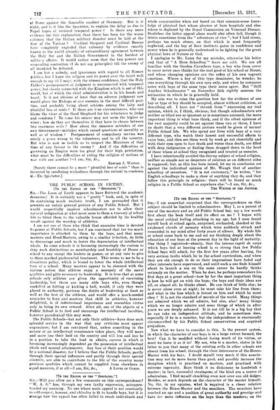[To THE EDITOR OF THE " EPPOTATOR.") you allow me
a few comments on thia correspondence? W. A. S." has, through my own faulty expression, iniaappre- hendedi my meaning. No one whose main appeal is not constantly to self-respect, honour, and chivalry is St to handle boys, but it is strange how the appeal has often failed to reach individuals and, whole communities when not based on that common-sense know- ledge of physical fact whose absence at base hospitals and else- where is deplored by the Royal Commission on Venereal Disease. Doubtless the latter appeal alone would aled often fail, though it deters sometimes from the " adventure of vice"; but I laid stress, perhaps too much stress, on that which is most frequently neglected, and the boy of finer instincts gains in confidence and power when he is generally understood to be fighting for the great physical laws of Nature or God.
I apologize to Mr. Lunn for my mistake, otherwise hie letter and that of "A Mere Schoolboy" leave mo cold. We are all familiar with the Gordon Caruthers type, a boy who from cover to cover never once thinks for the real good of his school or House, and whose changing opinions are the reflex of his own vagrant cmotione. Where a boy of this typo dominates, he wrecks; he sees everything through his own eyes only, and when he compares notes with boys of the same type their notes agree. But "Still Another Schoolmaster" on November 24th rightly assesses the estimation in which he is generally held.
My aim was to raise the question how far the evidence of one boy or type of boy should be accepted, almost without criticism, as describing all. I have not " shrunk from" expressing my real opinion, which is, I think, obvious; but though schoolmasters ar0 neither so blind nor no ignorant as is sometimes assumed, the more important thing is'what boys think, and if the silent opinions of the vast majority could be set against these two or three, I have no doubt that a very different picture would be given of normal Public School life. We who spend our lives with boys of a very different type, who watch their honest and successful efforts to raise tone, and then see them week by week go out cheerfully and with their eyes open to face death and worse than death, are filled with deep indignation at finding them dragged down to the level of those whom at school they recognized and treated as enemies. I have intentionally avoided the thorny subject of school religion, neither so simple nor so desperate of solution as on different sides is supposed; but, as this has been raised, let me in conclusion set against the individual opinion of Mr. Waugh that of another schoolboy of seventeen. "It is not customary," he writes, " for English schoolboys to make a show of anything they do, and they follow this principle in religion: there will be found as much religion in a Public School as anywhere else."—I am, Sir, Ac.,
Tea WRITP.R OF THE ARTICLII.


































 Previous page
Previous page